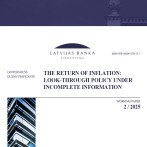On Inflation in July 2009
Annual inflation continued to decrease in July, reaching 2.5%. The continued rapidly decreasing demand and the reduction in the prices of energy resources had the greatest impact on consumer price dynamics. A drop in prices over June was observed in nearly all groups of consumer prices. Exceptions: as a result of changed excise tax rates, the prices of alcohol increased and the fees for financial services were also significantly on the rise.
As the downslide of prices of natural gas continued, so did heating tariffs, though the population will only feel the effect at the beginning of the heating season. The natural gas tariffs for households were also cut. As a result, the annual increase in administrated prices and its impact on annual inflation continued to diminish rapidly while still accounting for the greatest part of the annual price rises. In contrast to the tendency observed in the last few months, fuel prices also decreased in July.
In the next few months, the drop in purchasing power will continue to effect decreased prices; moreover, as the income of the public sector employees shrinks as provided for within the framework of budget amendments, an increased pressure on price reductions can be predicted. The price reduction tendency can be expected to continue over the later part of the year. Taking into account both the price rises registered in the first half of the year and the price reductions expected at the end of the year, the average inflation forecast for 2009 remains unchanged between 3.0 and 3.5 per cent.
The price levels compared to the previous month are continuing to decrease for a fourth consecutive month and this tendency can be expected to continue as the economy gradually returns to a sustainable income and price levels. For the consumer, the drop in prices under the conditions of a shrinking economy and reduced wages represents a certain relief. Enterprises have both the need and the opportunity to bring down the salary levels unmatched by productivity, as well as the prices inflated by the high expenditure and great demand. So at the moment the decrease in prices constitute a normal process. Deflation, the year-on-year price reductions, could become a serious problem for the economy only if it became protracted. For Latvia, as a small and an open economy, the risk of a deflation spiral sustained by expectations of ever greater downslide of the economy and prices, is insubstantial. The price levels in Latvia will be directly influenced by a returned growth in the EU, which will be followed by a moderate rise in prices.
Textual error
«… …»






